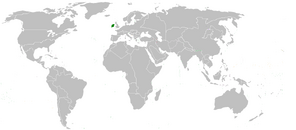Ireland is an island nation situated off the northwest coast of mainland Europe, directly west of Great Britain. Once a generally lawless island dotted by a handful of tribal kingdoms, Ireland was gradually conquered by Norman forces and eventually their English successors over several centuries, and formally made part of the United Kingdom of Great Britain and Ireland in 1801.
The nation suffered a tumultuous period during the 19th century. Its people faced severe repression at the hands of the British and endured a catastrophic famine that ravaged the Irish potato crop, the staple food of the island. Nearly a million died while millions more fled to foreign countries, particularly the United States, Canada, and later the Confederate States after that country won its independence. Twenty-six of Ireland's thirty-two counties would win their independence during the Irish Rebellion of 1916 to become the Republic of Ireland, although Britain maintained control of the remaining six counties in the north of the island ostensibly to protect the Protestant majority in those areas. This caused tremendous strife between rival sectarian factions as well as the British troops assigned to occupy the area that lasted for three decades under British rule and still continues to this day.
Ireland officially remained neutral during World War II, as the majority of its people felt equal disdain for their former British oppressors as they did the Nazi regime. As the war dragged on and Britain's resources wore thin, most of her troops were diverted from the troubled North to fight the Axis powers on the European mainland. Following the atomic bombing of Manchester in 1945, all of His Majesty's troops were recalled to assist in emergency relief on the British Isle itself, leaving Northern Ireland entirely unprotected. Eamon De Valera, the Irish Taoiseach (or Prime Minister), made the fateful decision to seize the opportunity and sent the small Irish Army into the six counties to reclaim what Irish nationalists viewed as Irish land. Although their force was small and under-equipped they met no resistance whatsoever from the handful of British troops that hadn't returned home, although they did meet armed if unorganized resistance from various Protestant insurgents. Such insurgents eventually established paramilitary organizations like the Ulster Volunteer Force (UVF), who have carried out various attacks on both government troops and civilians and continue to conduct acts of terrorism to this day.
Since the end of the war Ireland has both prospered and suffered as a result of its neutrality. Being so close to the massive German Reich while maintaining a democracy has forced Ireland to toe a fine line. For decades the nation has looked inward and isolated itself from the international community, which has caused its economy to stagnate. This policy has also allowed it to avoid drawing the ire of the Axis Powers, however, although the country has recently become more involved on the global stage, forging close ties with the US and its large Irish emigrant population and joining the Allied Nations at America's behest. Relations with Great Britain have also improved slightly, although their relationship remains cordial at best.


